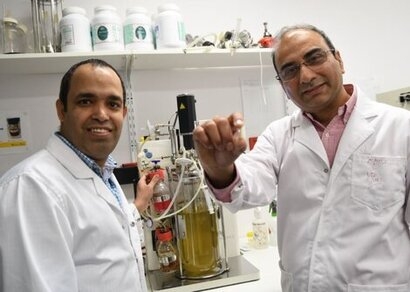
To save the world’s fish stocks and oceans, scientists are racing to find better and sustainable ways to make healthy nutritional products such as Omega-3 fatty acids, biodiesel, aquaculture and livestock food from fast-growing microalgae.
The innovative process, described in the international journal ACS Sustainable Chemistry & Engineering, describes the new method of using waste sulfur to produce enriched saturated triglycerides from sustainably produced algae oil.
The process uses a single reaction to simultaneously produce valuable polymers from polyunsaturated triglycerides and enrich saturated triglycerides for various value-added applications. The sulphur reaction can draw up to 90 percent of the unsaturated triglycerides from cultured single-cell algae.
“In this study, we build upon our body of work in sulphur chemistry to find an innovative way to process triglycerides from lipid-rich microalgae” said Professor Justin Chalker, whose organic polymers have been adapted for environmental remediation, slow-release fertiliser, insulation and e-waste. “In this case, the algae oil is reacted with sulphur. The polyunsaturated triglycerides form polymers with many established uses, such as environmental remediation. The saturated triglycerides remain unreacted in this process, for recovery and ultimate conversion to value-added substances such as biodiesel.”
Associate Professor Munish Puri, from Flinders University’s Bioprocessing Lab in Medical Biotechnology, has been working on single-cell oils to produce new materials suitable for nutritional supplements, animal-free meats, biodiesel and other products.
“There is growing interest in the bio-based production of lipids from algae” said Professor Puri, who has a background in industrial biotechnology and is leading the precision fermentation platform for producing such oils at Flinders University. “Single-cell thraustochytrids are especially attractive in this regard, as they can produce over 50 percent of their weight as triglycerides. But despite their promise, there remains a need for versatile downstream processing to enrich these so-called ‘single-cell oils’ into fatty acid classes based on degree of unsaturation. And that’s what this novel approach is helping to address.”
The article – Reaction of Sulfur and Sustainable Algae Oil for Polymer Synthesis and Enrichment of Saturated Triglycerides (2022) by Adarsha Gupta, Max JH Worthington, Harshal D Patel, Martin R Johnston, Munish Puri and Justin M Chalker – has been published in the American Chemical Society journal ACS Sustainable Chemistry & Engineering DOI: 10.1021/acssuschemeng.1c08139.
Image: Medical Biotechnology scientist Associate Professor Munish Puri and Bioprocessing Lab researcher Dr Adarsha Gupta with locally sourced Australian microalgae in culture.
For additional information:

